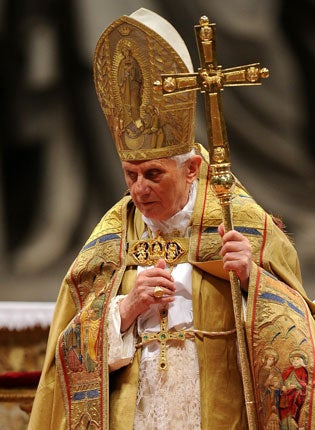Catholics weigh significance of Pope's words on condom use

The Catholic Church is in a state of some confusion over reports that Pope Benedict XVI has overturned a long-standing church ban on condoms by saying that their use is acceptable in exceptional circumstances.
But it is not clear what those circumstances are. It was widely reported yesterday that the Pope has decreed condoms may be used against Aids, which would be a remarkable U-turn in the history of Catholicism. The church's hardline stance on that has for years been heavily criticised. But some commentators suggest that the Pope seems only to be saying that the use of condoms to prevent the spread of HIV infections is only permissible under church teaching when they are being used by gay men.
The Pope commented on the matter in interviews with the German Catholic journalist, Peter Seewald, to be published in a book, Light of the World: The Pope, the Church and the Signs of the Times. In a series of interviews the Pope gave earlier this year he gives the example of the use of condoms by male prostitutes as "a first step towards moralisation".
The problem is that the traditional Catholic disapproval of condoms is rooted in a long-standing teaching that contraception is not acceptable because it means that sexual acts are not "open to the transmission of life" – a law which most Western Catholics, of course, ignore. But since sex between men is not open to the production of children, the use of a condom there would clearly be only for the prevention of disease.
The key question is whether the Pope is also saying that for heterosexual couples the prevention of disease should now have primacy over the ban on contraception. That would indeed herald the start of a sea change in the church's attitude. So far, the Pope is sending mixed messages.
What has added to the uncertainty is that the Pope, speaking in German, used the word ein Prostituierter, which signifies a prostitute of the masculine gender. But in German the grammatical masculine is also the default when speaking about any human individual in general.
What is clear is that the Pope continues to insist condoms are not the main solution to the Aids epidemic. When he speaks of their use as "a first step in the direction of a moralisation" he adds: "but it is not really the way to deal with the evil of HIV infection."
The Pope believes that the widespread distribution of condoms encourages the assumption that casual sex is normal and acceptable. More casual sex means more Aids, especially in Africa where there are widespread cultural as much as religious taboos against men using condoms. The real answer is fidelity and chastity, the Pope insists.
Many doctors fighting to stem the spread of HIV insist that this is a muddled and unrealistic approach. But there is no sign from the current interviews that the Pope has changed on this. That impression was reinforced yesterday by the Pope's chief press spokesman, Father Federico Lombardi, who issued a statement saying that the Pope's interviews do not reform or change church teaching. He said: "The reasoning of the Pope cannot certainly be defined as a revolutionary turn."
Still, there is something very significant about the Pope's remarks. They signal that the church's official position on human sexuality may be more open than has been generally assumed. For a start, though many Catholic moral theologians have been saying similar things for many years, this is the first time a pope has done so. That sends a big signal (even though Pope Benedict has in the past made a number of gaffes which mean that his understanding of semiotics is not so nuanced as his theology). Yet there is an interesting shift in language here. In the past, Catholic thinking on sexuality has been shaped by a tradition of natural law which is rooted in a medieval anthropology. It uses language about human beings which can sound absurd and offensive to modern ears, such as describing homosexuals as "intrinsically disordered".
The church's teaching on contraception was shaped long before the advent of Aids. But when Pope Benedict speaks of reducing the risk of infection as "a first step in a movement toward a different way, a more human way, of living sexuality" he is using, for the Vatican, a new kind of language. It appears rooted in a gradualist rather than an absolutist approach to ethics and a more compassionate understanding of sexuality and suffering.
Subscribe to Independent Premium to bookmark this article
Want to bookmark your favourite articles and stories to read or reference later? Start your Independent Premium subscription today.

Join our commenting forum
Join thought-provoking conversations, follow other Independent readers and see their replies